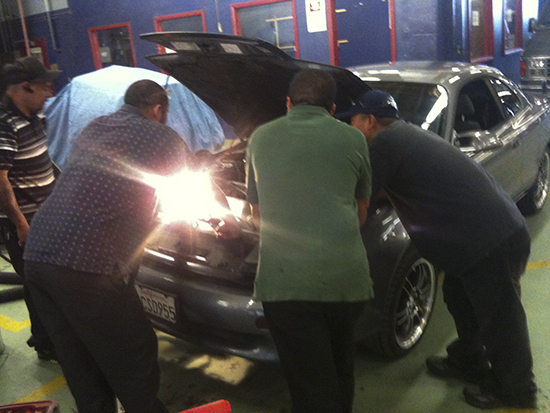Misfire Buick LaSabra
Can a Misfire cause a No Start Condition?
Misfire Buick LaSabra:
1998 Buick V6 3800 came in today on a hook or you may know it as a Tow truck. I spoke to the customer earlier that week and the customer was complaining of a misfire before it finally stalled out.
Well, when we finally got our hands on this 1998 Buick LaSabra, the V6 3800 started. But the Buick LaSabra once started still had a misfire.
Misfire Buick LaSabra

I was always told not to use a test light, on computer control cars
Misfire Buick LaSabra:
We continue our diagnosing anyway, we decided to check for the misfire first. What we found was, two of the cylinders did not have spark from the number 1 coil, while the other four cylinders did.
We used a test light as the method of choice to check for spark, I usually would check for spark using a ST-125 spark tester, but the test light is much faster and easier.
Just remember this method isn’t checking for spark output, it’s just checking for spark. This way we can determine the Buick LaSabra Misfire.
The goal with the test light is not to check for spark output it's just to check for spark. In this procedure you would ground the test light, “not to the battery” connect it to a good engine ground.
Hold the tip of the test light close to each spark plug wire near the coil tower, the procedure is to remove one wire at a time and watch for spark to jump from the coil tower to test light.
If the coil produces spark and it jumps from the coil tower to the test light, at least you know the coil can produce the spark.
If the coil doesn’t produce the spark, either you have a bad coil or ignition module.
Misfire Buick LaSabra:
So is it a Bad Ignition Coil or Bad Ignition Module
Worse case the 1998 Buick LaSabra with the misfire, could have wiring problems or a defective crank sensor.
How can you determine if you have a bad ignition coil or ignition module is simple. The coil that isn’t producing spark, switch it with one the coils that is producing spark.
If the cylinder that didn’t spark cylinder now has spark and the cylinder that did have spark now doesn't, the 1998, Buick LaSabra has a bad ignition coil.
But if the same cylinder after switching the coils still doesn’t have spark, the vehicle has a bad ignition module.
The ignition module job is to trigger each individual coil at the proper time to fire the correct cylinder at the right time via inputs from the cam and crank sensor.
It’s possible for the module to go bad and not fire one coil or two cylinders, but yet fire the other four cylinders.
Just switch the Ignition Coils
Misfire Buick LaSabra:
By switching the coils, you are confirming the primary circuit in the module can trigger the ignition coil.
So, if you switch the coils and the spark follows the coil as you switch it, were as the no spark coil still doesn't have spark, after you switch it, this simply means you have a bad ignition coil.
If the spark doesn’t follow the coil, meaning the no spark cylinder still doesn’t have spark, after you switch coils, you have a bad module.
Now remember this Buick LaSabra misfire compliant also has a No Start condition, and a bad module will cause both conditions.
Now you can use an ohmmeter to check the ignition coils, but an ohmmeter is not always reliable.
Meaning, in some cases ohming out ignition coils, may not tell you if it’s bad. I have seen ignition coils ohm out good, but the ignition coil was bad.
The test light method is a quick and easy test, but the spark tester ST-125 is the best method for checking maximum coil output.
Just my opinion.
I tell all my students to have one or two spark testers in their tool box.
Also remember a misfire will cause high Hydrocarbons and kill the catalytic converter and eventually melting it down causing no power.
I would appreciate it, if this information help you in any way, please click the face book like button.
Need help passing ASE L1 check out my Free ASE Preparation Guide
Back To The OBD2 Intro Page
CLASS SCHEDULES
Emission Control 1:
B.A.R. Smog Check
Inspector Level 1
(Inspector "Smog" License):
Engine Fundamentals
8am - 12:15 pm
Summer Class
7/5/2022 -8/5/2022
Class # 799065
Emission Control 2:
B.A.R. Smog Check
Inspector Level 2
(Inspector "Smog" License):
Rules and Regulations
8am - 12:15 pm
Summer Classes
7/5/2022 - 8/5/2022
Class # 799067
Engine Performance 1:
8am - 12: 15 pm
Date: TBD
Class # 799069
Engine Performance 2:
B.A.R. Specified Diagnostic
and Repair Training
(Repair "Smog" License)
Time: TBD
Date: TBD
Class # 799071
Emission Control 1
(Inspector "Smog" License):
5:00pm - 8:45 pm
Date: TBD
Class # 799065
Emission Control 2:
(Inspector "Smog" License):
5:00pm - 8:45 pm
Date: TBD
Class # 799065
Exhaust Emissions (Update Class):
5:30 pm - 8:45 pm
Tuesday nights:
Dates: coming soon
Class # 796070